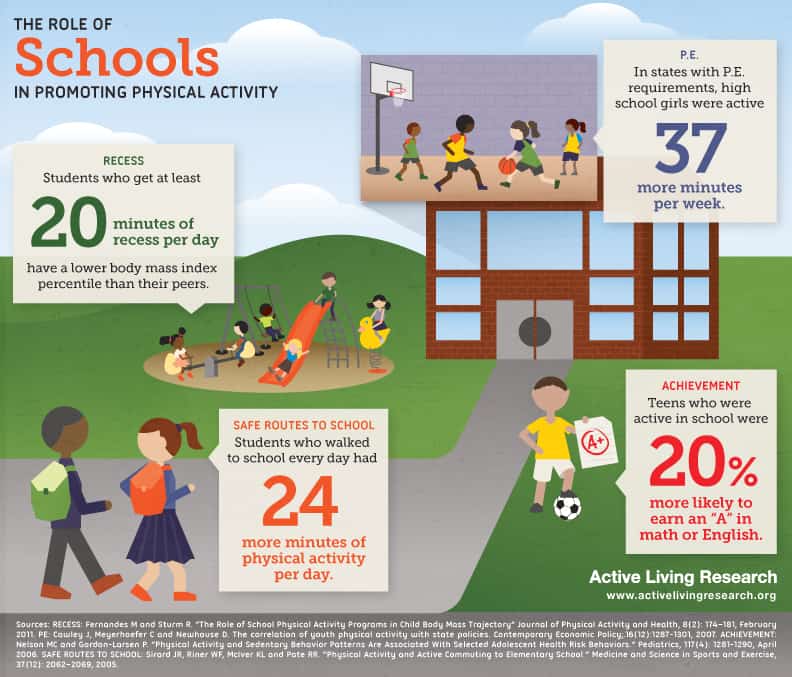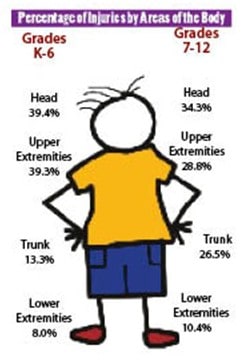Address
304 North Cardinal St.
Dorchester Center, MA 02124
Work Hours
Monday to Friday: 7AM - 7PM
Weekend: 10AM - 5PM
Address
304 North Cardinal St.
Dorchester Center, MA 02124
Work Hours
Monday to Friday: 7AM - 7PM
Weekend: 10AM - 5PM
As back to school time approaches, parents across the country are preparing their kids for class. They shop for new notebooks, pencils, and calculators—everything kids need to succeed in their academic classes. This time of the year isn’t just about a return to scholastic achievement, however. Studies show that Canadian kids are getting less physical exercise, which impacts physical and mental health.
In the latest report released by ParticipACTION, an organization that tracks the physical activity of school kids, Canadian children received a dismal D+. Between the ages of 5 to 17, only 35% of kids are getting enough physical exercise. The time they should be using to exercise is often spent staring at screens.
When kids don’t get enough exercise, their physical health can suffer. They don’t develop sufficient muscle strength, their cardiovascular health worsens, and they gain weight. Lack of exercise doesn’t just impact the body, however; it also affects kids’ cognitive development.
There are in-classroom consequences for kids who fall below the recommended activity threshold. When kids get regular exercise, they’re more likely to exhibit creativity, attentiveness, retention, and problem-solving skills. Exercise can also increase mental wellbeing, thus limiting the risks for depression and anxiety.
Exercise improves the overall health for many reasons. When kids are active, they’re more likely to get a full night of sleep. A solid eight hours of shuteye gives the body the chance to repair and restore itself, which is essential for still-growing kids. Exercise also activates production of mood-boosting chemicals, like serotonin and endorphins. This helps kids regulate their emotions and get rid of stress. Cardiovascular activity may even improve memory!
In today’s fast-paced world, it can be hard to fit exercise into your family’s schedule. If your kids don’t want to join sports teams, however, they can still find ways to exercise. A little bit of exercise is better than none; if your kids spend 10 minutes every day engaging in a physical activity, they’re more likely to be healthy, happy, and productive. Try using back to school season as an opportunity to explore new exercises!

While back to school physical activity is essential, it can lead to unwanted injuries. Every year, thousands of school days are missed because a kid is at home nursing an injury. For younger kids, most of these injuries happen on the playground. Almost 70% of injuries sustained by kids under 10—which range from scraped knees to broken bones—occur on the playground during recess. These injuries are most commonly caused by falls. When kids fall off the monkey bars or slip during a game of tag, they can get injured. While physical activity needs to be encouraged, kids also need to stay safe.
If you’re worried about your kid’s safety, check out their school’s playground. Common safety hazards include loose nuts or bolts and aged playground equipment. The surfaces beneath the playground equipment are often the most important factor, however. Playgrounds should use loose-fill materials to construct surfaces, as rubber mulch, pea gravel, and wood chips have “give.” When a child falls on loose-fill materials, they are less likely to sustain injury. Surfaces without “give,” like asphalt and concrete, can be more dangerous.
For kids between the ages of 5 and 17, the head is the most common injury at school. After the head, the upper extremities are most likely to be injured. When kids fall off the monkey bars, the arms and shoulders often bear the brunt of the impact. The trunk of the body receives between 13 and 26% of injuries, and the lower extremities get between 8 and 10% of the injuries.

After kids sustain an injury at school or a sports injury, physiotherapy can help speed up their recovery. When working with recently injured kids, physical therapists help them restore muscle strength, increase range of motion, and regain the motor skills needed for daily activities.
There are many physiotherapy treatments developed specifically for kids. Adaptive play activities use kid’s love of play to improve their physical well being. For younger kids, physiotherapist may concentrate on developmental activities, like walking and crawling. For older kids dealing with a sports injury, therapists may opt for conventional treatments, like flexibility exercises, strength-building exercises, balance training, and circulation stimulation. These methods can help kids recover from myriad school-related injuries, ranging from twisted ankles to broken arms.
When treating kids, physiotherapist also provide the child and their family with preventative training. Depending on the injury, the therapist will give tips on how to avoid such accidents in the future. To keep a child safe, they need a safe body, a safe environment, and safe physical activity.
Make sure your kid knows how to use the playground equipment. Using the equipment incorrectly—like jumping off swings and climbing up slides—can increase risk of falls. Make sure your kid has appropriate supervision when they’re using the playground, and inquire whether the school does regular inspections of the equipment.
Safe environment refers to the area where your kid plays. If the school’s playground or sports fields seem like potential safety hazards, contact the school to notify them of the danger.
When a kid has a safe body, they’re physically prepared for exercise and wearing the appropriate safety gear. They should have sunscreen, water, and energy-fueling food. Before rigorous activities, it’s always best for kids to warm up their muscles via gentle stretching.
When a kid engages in safe physical activity, they develop the skills that minimize their risk for injury. If your kid knows the rules of their favorite games, engages in multiple physical activities, and performs these activities on a regular basis, they’re more likely to be healthy in all the ways that count. A trained physiotherapist can help your kid develop these essential safe skills.
If you think your kid could benefit from kid-specific physiotherapy, contact one our physiotherapy clinics in Pickering or Milton to learn more!